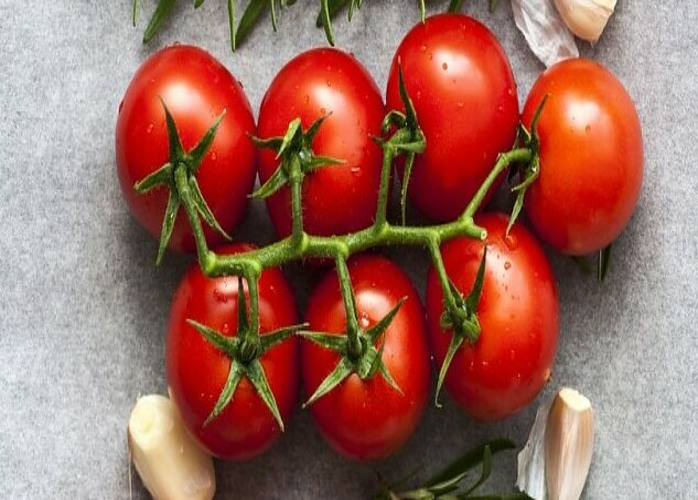
Yes, dogs can safely eat ripe, red tomatoes in moderation. But before you let your furry friend chomp on a cherry tomato, it’s important to differentiate between what’s safe and what’s not.
At perfectpuppypal.com, we are not qualified veterinarians or animal nutritionists. The information that we provide is general and educational information only and is not a substitute for professional advice.
The concern lies mainly with green, unripe tomatoes, their stems, and leaves. These parts contain a substance called solanine, which can be harmful to dogs in large quantities. However, ripe tomatoes have significantly lower levels of solanine, making them safer for canine consumption.
When introducing tomatoes to your dog’s diet, keep in mind that every dog is unique. Some might have specific health conditions or food sensitivities that could make tomatoes a less ideal treat. Always check with your vet first to ensure it suits your dog’s dietary needs.
Nutritional Benefits of Tomatoes for Dogs
Tomatoes aren’t just a tasty treat for us, they can be for dogs too, provided they’re served correctly. They come packed with essential vitamins and minerals that can contribute positively to your pup’s diet.
Vitamins A and C, along with potassium, are the main nutritional players in a tomato. Vitamin A supports vision, while vitamin C bolsters the immune system and potassium is vital for muscle health.
Lycopene, the pigment that gives tomatoes their red color, has antioxidant properties that may help reduce the risk of heart disease and support bone health in dogs.
Introducing tomatoes to your dog should be done carefully, ideally under your vet’s advice. The quantity should be small to start with, ensuring it’s a complement to a well-rounded diet, not a replacement for other nutrition.
When Tomatoes Can Be Harmful to Your Dog
Although ripe tomatoes are safe for dogs, there’s a catch: green tomatoes, as well as the leaves and stems of the tomato plant, may pose a risk. These parts contain a substance called solanine, a glycoalkaloid that can be toxic if consumed in large quantities.
Awareness about solanine is crucial; it’s a natural defense mechanism of the plant. While a small nibble of green tomato or plant material is unlikely to harm your dog, larger amounts can lead to tomato poisoning. This is rare, but it’s important to err on the side of caution.
Symptoms of tomato poisoning in dogs are often related to gastrointestinal and neurological disturbances. Look out for signs like gastrointestinal upset, lethargy, weakness, confusion, and abnormal heart rate. If your dog experiences any of these after ingesting green tomatoes or plant parts, it’s essential to contact your veterinarian immediately.
As a safety measure, it is best to keep your dog away from tomato plants, especially if they have a habit of nibbling on greens. If you grow tomatoes at home, consider a secure barrier that prevents your pet from accessing them.
In addition to solanine, it’s important to be mindful of other ingredients that dogs might ingest with tomatoes. Things like seasonings, oils, or any dish where tomatoes are just one component, may have other harmful foods for dogs, such as onions and garlic.

Best Practices for Feeding Your Dog Tomatoes
To ensure your furry friend enjoys the benefits of tomatoes without any risks, follow these simple guidelines:
ALWAYS CHOOSE ORGANIC: Select organic tomatoes to minimize pesticide exposure which can be harmful to your dog’s health.
WASH THEM THOROUGHLY: Like with any produce, washing helps remove any residual pesticides and dirt from the tomatoes.
REMOVE THE STEM AND LEAVES: These parts of the tomato plant contain solanine, which is toxic to dogs.
KEEP IT PLAIN: Serve tomatoes without any additional seasoning or ingredients that can be harmful to dogs, such as garlic or salt.
START SMALL: Introduce tomatoes into your dog’s diet gradually to ensure they don’t have an adverse reaction.
CONSULT YOUR VET: If your dog has any health issues or dietary restrictions, it’s wise to talk to your vet before adding new foods to their diet.
In conclusion, tomatoes can be a healthy, low-calorie snack for dogs, providing hydration and essential nutrients. As long as you stick to ripe tomatoes and keep an eye on portion size, this garden favorite can be a safe and tasty treat for your pet.
Remember, moderation is key. If you’re ever unsure, your vet can offer personalized advice to match your dog’s specific health needs.
As always please feel free to leave a comment below if your dog loves the taste of tomatoes or not!
